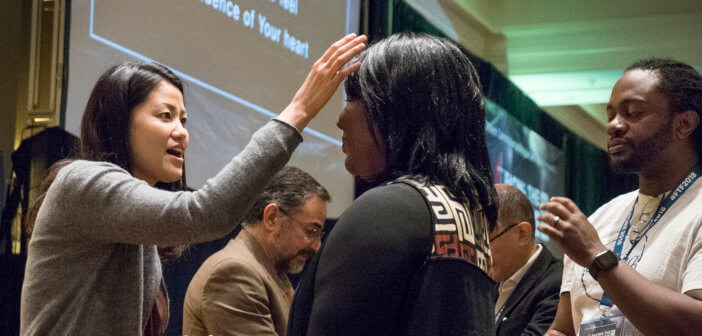HiRho Y. Park has studied how pastoral leaders can be more effective in cross-racial and cross-cultural ministry contexts. These pastors can be bridge builders, she says, by practicing their faith, proclaiming the Word of God, and leading from the woundedness of suffering and racism.
Pastors who are successfully leading cross-racial and cross-cultural churches are the ones who are able to bring together multicultural perspectives, not only in the formation of their own identity but also in their ministry. By doing so, they demonstrate an inclusive leadership style as bridge builders with cross-racial and cross-cultural competency and sensitivity. Bridge builders not only bring diverse people together based in Christian faith, but also connect people to God.
Building bridges by living faith
Practicing living faith is essential in the formation of a visible church. For John Wesley, founder of the Methodist movement, living faith should be expressed in and through various spiritual practices, such as Bible study, prayer, fasting, and the Lord’s Supper. Likewise, the living faith of racial-ethnic pastors serving large Caucasian-major churches is manifested through such things as personal worship, regular spiritual retreats, and spending time with a spiritual director.
In fact, our study found that successful racial-ethnic cross-racial and cross-cultural pastors especially develop personal virtues, such as “patience,” “remembering who they are,” and “letting go,” which are also significant characteristics of bridge builders. These pastors mentioned that their personal practice of faith — living faith — developed their character as strong and resilient Christian leaders who can empathize with the sufferings of others.
Building bridges by preaching the Word of God
Proclaiming the unconditional love of God and God’s grace for all people is one of the main themes that racial-ethnic, cross-racial, and cross-cultural pastors preach. Preaching nourishes and strengthens the soul by teaching Christians how to walk in Christ in everyday life. Wesley believed that preaching the Word of God “begets faith” in true believers in that it teaches and guides them to live in holiness of life as disciples of Christ. In other words, preaching is a tool for inaugurating a space for openness to otherness within a Christian community by initiating theological reflection among Christians.
Being a wounded healer: Listening is the beginning of healing
Pastors in cross-racial and cross-cultural settings must be willing to go beyond their professional role and, in the image of Christ, leave themselves open to fellow human beings with the same wounds and suffering. In other words, we heal from our own wounds in the process. For example, pastors in cross-racial and cross-cultural appointments live and serve others, with their wounds and sufferings from racism and combinations of racism and sexism, alienation, and loneliness.
As pastors in cross-racial and cross-cultural ministry settings, we are called to serve God, our church members, our neighbors, and the world as well. The example and model of our ministry is Jesus, who is a wounded healer. In addition to recognizing their vulnerability to the “isms” of the world, they must also be in the process of their own healing. Their spirituality amid this woundedness and healing can equip and strengthen them to continue to serve God, the local church, the community, and the world.
This material is excerpted from Develop Intercultural Competence: How to Lead Cross-Racial and Cross-Cultural Churches (General Board of Higher Education and Ministry, 2018) by HiRho Y. Parks. Used by permission. The book is available at Cokesbury and Amazon.
Related Resources
- 4 Goals that Promote Healthy Multicultural Ministry by Albert Shuler
- When a Pastor Serves a Church of a Different Racial or Cultural Background by Jasmine Smothers
- For Multicultural Churches — A Variation on the Golden Rule by Douglas J. Brouwer






